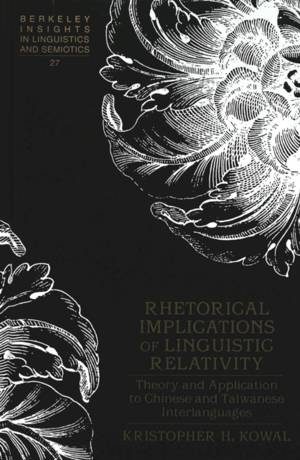
- Afhalen na 1 uur in een winkel met voorraad
- Gratis thuislevering in België vanaf € 30
- Ruim aanbod met 7 miljoen producten
- Afhalen na 1 uur in een winkel met voorraad
- Gratis thuislevering in België vanaf € 30
- Ruim aanbod met 7 miljoen producten
Zoeken
Rhetorical Implications of Linguistic Relativity
Theory and Application to Chinese and Taiwanese Interlanguages
Kristopher Kowal
€ 62,95
+ 125 punten
Omschrijving
Popular readings of Benjamin Lee Whorf's «principle of linguistic relativity» focus almost exclusively on the controversial notion that language constrains or determines thought. Recent scholarship has only begun to assess the creative epistemological and pragmatic dimensions of Whorf's theory of language, and their compatibility with the ideas of his contemporaries in rhetoric, philosophy, and psychology. This book provides a new reading of Whorf which situates his writings among those of Bakhtin, Vygotsky, and Wittgenstein. Exploring the ramifications of linguistic relativity for rhetorical theory, the philosophy of language, and interlingual discourse analysis, the author re-accentuates Whorf's belief in the need to overcome linguacentrism and ethnocentrism through an «enlightened multilingual awareness».
Specificaties
Betrokkenen
- Auteur(s):
- Uitgeverij:
Inhoud
- Aantal bladzijden:
- 310
- Taal:
- Engels
- Reeks:
- Reeksnummer:
- nr. 27
Eigenschappen
- Productcode (EAN):
- 9780820433431
- Verschijningsdatum:
- 1/06/1998
- Uitvoering:
- Hardcover
- Formaat:
- Genaaid
- Afmetingen:
- 160 mm x 230 mm
- Gewicht:
- 619 g

Alleen bij Standaard Boekhandel
+ 125 punten op je klantenkaart van Standaard Boekhandel
Beoordelingen
We publiceren alleen reviews die voldoen aan de voorwaarden voor reviews. Bekijk onze voorwaarden voor reviews.











